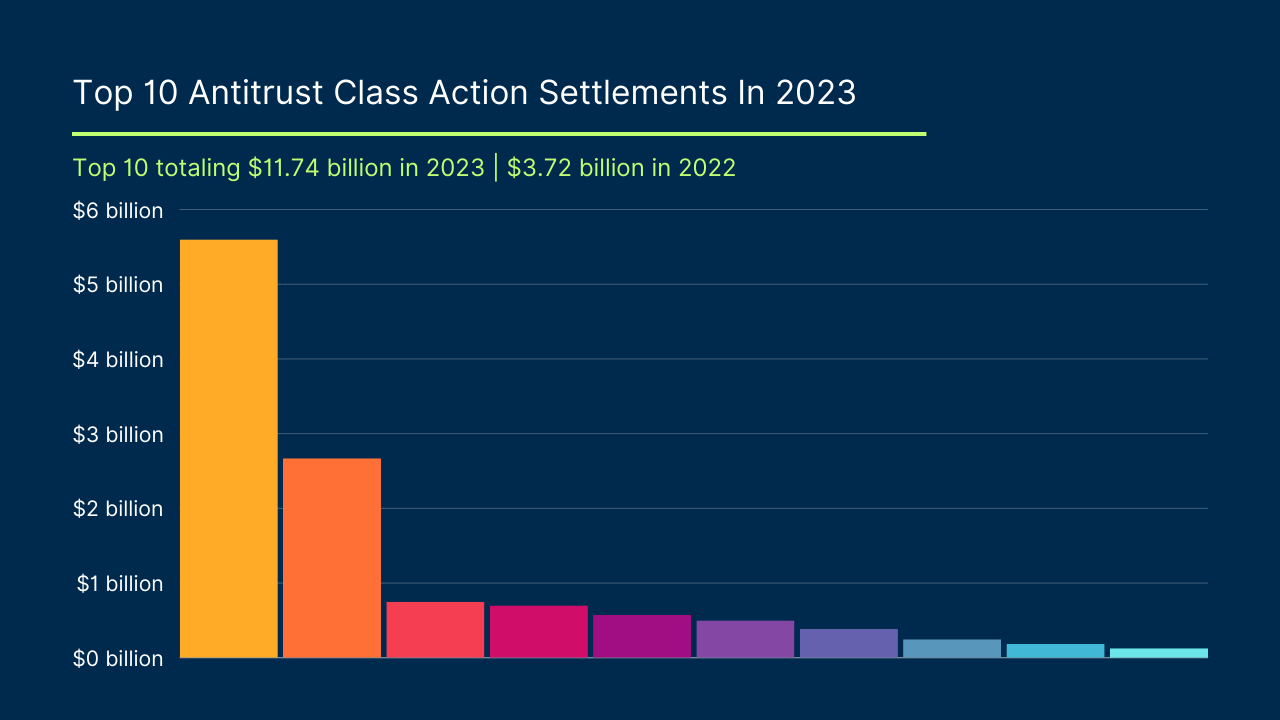
Duane Morris Takeaway: This week’s episode of the Class Action Weekly Wire features Duane Morris partner Jennifer Riley and associates AJ Rudowitz and Daniel Selznick with their discussion of 2023 developments and trends in antitrust class action litigation as detailed in the recently published Duane Morris Antitrust Class Action Review – 2024.
Check out today’s episode and subscribe to our show from your preferred podcast platform: Spotify, Amazon Music, Apple Podcasts, Google Podcasts, the Samsung Podcasts app, Podcast Index, Tune In, Listen Notes, iHeartRadio, Deezer, YouTube or our RSS feed.
Episode Transcript
Jennifer Riley: Welcome to our listeners. Thank you for being here for our weekly podcast, the Class Action Weekly Wire. I’m Jennifer Riley, partner at Duane Morris, and joining me today are associates AJ Rudowitz and Daniel Selznick from our Philadelphia office. Thank you for being on the podcast today, guys.
AJ Rudowitz: Thanks, Jen. Happy to be part of the podcast.
Daniel Selznick: Thanks, Jen, glad to be here.
Jen: Today on the podcast we are discussing the recent publication of this year’s edition of the Dwayne Morris, Anti-trust, class Action Review. Listeners can find the e-book publication on our blog, the Duane Morris Class Action Defense Blog. AJ, can you tell our listeners a bit about the publication?
AJ: Absolutely, Jen. Happy to talk a little bit about the publication, and I know all the contributors are very happy with and proud of the final work product. So, in 2023, we saw many key developments in class action litigation involving antitrust claims. And as we know, most antitrust class actions are settled before trial, and one of the most crucial phases of the case, if not the most crucial phase, is class certification. Thus the order granting or denying a motion to certify a class in all these cases is critical to the ultimate outcome, and particularly the settlement of all these cases. This stage is it’s akin to winning or losing the coin toss, and over time in an NFL game for any football fans out there. It’s very determinative of the outcome, which is usually settlement. To assist companies and employers with understanding what these key developments mean in facing antitrust claims, Duane Morris has released the 2024 Duane Morris Antitrust Class Action Review, which analyzes the key rulings and litigation developments from 2023, and the significant trends that are necessarily going to impact these types of cases, these types of class actions in 2024 and beyond. And we hope that companies and employers will benefit from this resource in their compliance with these evolving and highly impactful laws and standards that can oftentimes result in high-stakes litigation.
Jen: Daniel, what were some of the key takeaways from the publication with regard to litigation in this area in 2023?
Dan: Sure. So one of the topics that was actually fairly prevalent this year, and what we discussed in the publication, was courts’ treatment of so called no-poach or no-hire agreements. As a general matter, a recurring issue, and sort of major battleground in antitrust cases is whether the court is going to apply a per se treatment, a quick look, analysis, or a rule of reason test, and that was certainly the case in 2023 with respect to cases involving no poach agreements.
One of the most significant cases came out of the Seventh Circuit in a case captioned Deslandes, et al. v. McDonald’s. In that case, a group of former McDonald’s workers alleged that they had been restricted in their ability to earn higher wages because of a provision in McDonald’s franchising agreements that prohibited a franchise from hiring another franchise’s employee who was within 6 months of leaving that franchise. The district court concluded that the plaintiffs were not entitled to a per se treatment, because in the courts view, the no-poach agreement at issue was ancillary to the franchise agreement. In the court’s view, it expanded the output of McDonald’s food, and it aided in the success of a cooperative venture. On appeal, the Seventh Circuit reversed and remanded the district court’s decision, and what the Seventh Circuit essentially said was that while there was a possibility that these no-poach provisions were ancillary to the franchise agreement – and one of the things that the Seventh Circuit mentioned was it may have been there to protect franchise, franchise investments, and training of employees – the court was not satisfied with the district court’s reasoning, and found that just because it could potentially increase the output of burgers and fries, that determination is immaterial and does not justify any detriment to workers that could have been caused by these no-poach agreements.
Jen: Interesting. AJ, what are some of the setbacks, and what will this really mean for companies in 2024?
AJ: Well, there’s certainly a few takeaways from the Seventh Circuit’s Deslandes decision. First and foremost, it is important in the antitrust class action context, because it supports the Justice Department’s position that no-poach agreements can be adjudicated as per se violations of Section 1 of the Sherman Act, and the U.S. Supreme Court has since denied McDonald’s petition for review. So, as a very general matter, it is, of course, easier for plaintiffs in antitrust class actions to secure class certification, and to win on the merits, if the alleged anti-competitive conducted issue is treated as per se anti-competitive, rather than being required to go through the full rule of reason analysis, or the so-called quick look analysis. And the Deslandes case will certainly impact any future no-poach cases specifically, and we can anticipate more class actions being brought by plaintiffs in this context. Companies and employers will need to develop new strategies both before litigation to try to prevent it, and during any such litigation to try to defeat it.
Jen: Thanks so much for that information – very important for companies navigating compliance with the antitrust statutes. The review also talks about another important no poach anti-trust class action ruling in 2023. Daniel, could you tell us a bit about that decision?
Dan: Sure, Jen. So that case came out of the United States District for the District of Connecticut, and the case captioned Borozny, et al. v. Raytheon Technologies Corp. In that case the plaintiff filed a class action alleging six corporate defendants violated Section 1 of the Sherman Act by conspiring to restrain wages, essentially by secretly agreeing to restrict competition for the recruitment and hiring of aerospace engineers and similarly skilled workers in in that space. The defendants move to dismiss, arguing that the alleged anti-competitive agreement was vertical in nature rather than horizontal, and therefore it should not be afforded per se treatment. The court disagreed with defendants and denied the motion, holding that even though the defendants were operating at different levels in the supply chain – for example, some of the defendants were manufacturers and some were distributors – the court found that, in fact, the relevant market was the market for aerospace workers, and that, even though defendants were participating in a vertical supply chain, with respect to the market for workers, they competed horizontally. So in this instance, the court found that the labor market restraint at issue was a naked restrain on trade, and not ancillary to any legitimate or competitive purpose such that the complaint adequately pleaded for per se treatment.
Jen: Thanks so much. I anticipate that these issues will remain hotly debated in the courts in 2024. The review also talks about the top antitrust class action settlements in 2023. How do plaintiffs do in securing settlement funds this past year?
AJ: Plaintiffs were hugely successful. In 2023, the top 10 antitrust class action settlements totaled over $11.7 billion, which was nearly a threefold increase over the prior year. By comparison, the top 10 settlements for antitrust class actions in 2022 totaled only $3.7 billion. And that’s something to keep an eye on here in 2024.
Jen: Wow! We will continue to track those settlement numbers in 2024, as record breaking settlement amounts have been a trend that we’ve been tracking over the past two years. Thank you to AJ and Daniel for being here today, and thank you to our listeners for tuning in. Please stop by the blog for a free copy of the Antitrust Class Action Review e-book.
Dan: Thanks for having me, Jen. Thanks, listeners, and I hope you enjoy the publication, and look forward to doing another one of these.
AJ: Thanks, so much, everybody.

